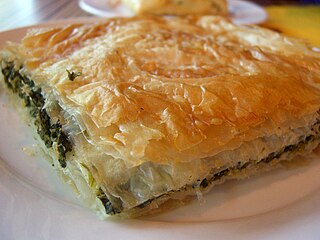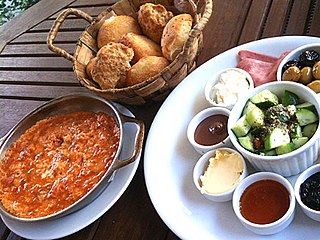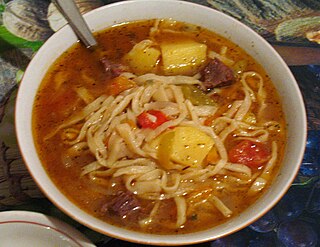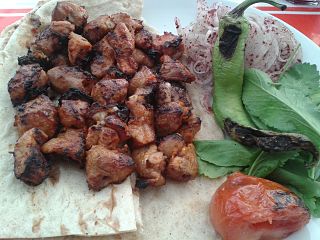| Main ingredients | Flour, eggs, sugar, spinach and baking powder |
|---|
Spinach cake is cake that contains spinach mixed into the batter. [1] [2] [3]
| Main ingredients | Flour, eggs, sugar, spinach and baking powder |
|---|
Spinach cake is cake that contains spinach mixed into the batter. [1] [2] [3]
| Type | cake |
|---|---|
| Place of origin | Turkey |
| Main ingredients | egg, granulated sugar, milk, vegetable oil, spinach puree, baking powder, vanilla extract, flour, heavy cream, powdered sugar |
In Turkish cuisine, ispanaklı kek (spinach cake) is a cake prepared with spinach as a primary ingredient. [4] [5] [6] [7]

Tzatziki, also known as cacık or tarator, is a class of dip, soup, or sauce found in the cuisines of Southeastern Europe and West Asia. It is made of salted strained yogurt or diluted yogurt mixed with cucumbers, garlic, salt, olive oil, red wine vinegar, sometimes with lemon juice, and herbs such as dill, mint, parsley and thyme. It is served as a cold appetiser (meze), a side dish, and as a sauce for souvlaki and gyros sandwiches and other foods.

Savory spinach pie is a pastry eaten throughout the Balkans. The filling is made of chopped spinach and usually feta or white cheese, and egg.

Nokul or lokum is a type of puff pastry from the Turkish cuisine. It is common in the Central Black Sea Region of Turkey and the Turkish-minority areas of Bulgaria with variations. Nokul is sometimes served hot as an appetizer instead of bread. It consists of a rolled sheet of yeast dough onto which feta-style white cheese, walnut or poppy seed is sprinkled over a thin coat of butter. The dough is then rolled, cut into individual portions, and baked.

Börek or burek is a family of pastries or pies found in the Balkans, Turkey, Armenia, the Levant, Northern Africa and Central Asia. The pastry is made of a thin flaky dough such as filo with a variety of fillings, such as meat, cheese, spinach, or potatoes. A borek may be prepared in a large pan and cut into portions after baking, or as individual pastries. They are usually baked but some varieties can be fried. Borek is sometimes sprinkled with sesame or nigella seeds, and it can be served hot or cold.
Teleme or teleme peyniri is a white semi-soft cheese made from cow's, goat's, and sheep's milk, originating in ancient times in the Middle East and Mediterranean.

Menemen is a popular traditional Turkish dish that includes eggs, tomato, green peppers, and spices such as ground black and red pepper cooked in olive oil.

Ekmek kadayıfı is a specialty dessert of Turkish cuisine but it is also known in many regions that was historically part of the Ottoman Empire. The Turkish name of the dessert literally translates as "Kadayıf made of ekmek " giving clues on its preparation. The dessert is usually served with kaymak, a kind of clotted cream. Historically being a regional specialty of Afyonkarahisar, the dessert is served in special events within its region of origin. The dessert may optionally be flavored or topped with cherries of which Afyonkarahisar produces a significant amount. In Greek cuisine, it is known as "ekmek kataifi".

Cezerye is a semi-gelatinous traditional Turkish dessert made from caramelised carrots, shredded coconut, and roasted walnuts, hazelnuts, or pistachios. Cut into matchbox-sized rectangular chips, it is traditionally served on special occasions. It originated from the Turkish province of Mersin. Grated carrots are boiled first and then roasted with sugar, coconut powder is spread on it, and pistachios, hazelnuts, peanuts or walnuts are put in it.

Kesme or erişte is a type of egg noodle found in various Central Asian countries. It is also found in Turkish cuisine and is called erişte and “kesme” in modern standard Turkish. The word itself is a nominalisation of the verb to cut or to slice, referring to the slicing of the dough involved in preparing the noodles. The term may refer to the noodles themselves, or the prepared dish made with them. Kesme is traditionally a homemade dish, and not often found at restaurants or cafés. In Turkey, kesme is also known as "erişte", and eaten generally in winter. It is made from flour, egg, water, salt and milk. These ingredients are worked into a dough, which is rolled out, cut, and dried in the sun or an oven after dried for a day.

Glasswort salad or samphire salad is a salad in Turkish cuisine. Glasswort salad is made with glasswort, lemon juice, olive oil and garlic. It is commonly served as a meze.

Sharbat is a drink prepared from fruit or flower petals. It is a sweet cordial, and usually served chilled. It can be served in concentrated form and eaten with a spoon or diluted with water to create the drink.
Soğan kebabı is a Turkish kebab dish made with ground lamb kofte baked inside sliced onions, peppers and pomegranate sauce.

Kuzu şiş is a Turkish lamb kebab made with the thigh of the lamb, and served with onion and tomato garnishes.

Bursa cantik pide is a traditional Turkish recipe for a dish of pizza dough filled cheese, ground meat, or other fresh or cured meats, and/or vegetables.

Şevketibostan yemeği is a dish cooked and consumed in Aegean region of Turkiye. Ingredients include Şevketibostan, lamb chunks, onion, juice of half a lemon, flour, butter, and salt.

Su böreği is one of the most common types of börek. Sheets of dough are boiled briefly in large pans, then a mixture of beyaz peynir or künefe peyniri and parsley and oil is scattered between the layers. The whole thing is brushed with butter and laid in a masonry oven to cook. it may be thought of as a drier, less saucy version of the Italian lasagna.

Künefe peyniri a Turkish cheese made of cow milk, goat milk, or a combination, and used to prepare künefe.

The peinirli is an elongated, open pie made in a boat shape. They contain a substantial amount of yellow cheese and optionally, meats or vegetables. Peinirli originated in Turkey, where it is known as peynirli. There are two types of pide: peynirli pide, in which cheese entirely covers the surface of the filling and karışık pide, which has cheese only as part of the filling.

Pideli köfte is one of the best-known dishes of Turkey.
Ispanaklı yumurta, Ottoman and Turkish Jews is a Turkish dish made with eggs, fried onion and spinach. Its recipe is given in the Ottoman Cookbook Aşçıbaşı written by Mahmud Nedim Bin Tosun.